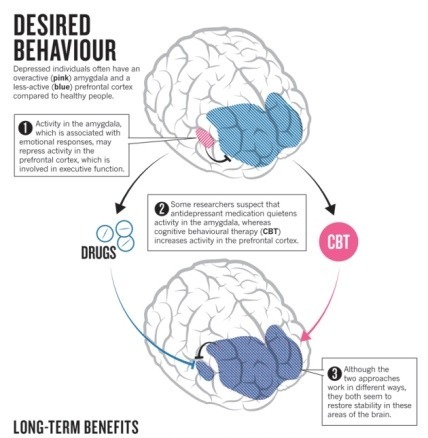—
Depression: A change of mind (Nature):
“Cognitive therapy, commonly known as cognitive behavioural therapy (CBT), aims to help people to identify and change negative, self-destructive thought patterns. And although it does not work for everyone with depression, data have been accumulating in its favour. “CBT is one of the clear success stories in psychotherapy,” says Stefan Hofmann, a psychologist at Boston University in Massachusetts…
Antidepressant drugs are usually the first-line treatment for depression.
They are seen as a quick, inexpensive fix — but clinical trials reveal that only 22–40% of patients emerge from depression with drugs alone. Although there are various approaches to psychotherapy, CBT is the most widely studied; a meta-analysis1 published this year revealed that, depending on how scientists measure outcomes, between 42% and 66% of patients no longer meet the criteria for depression after therapy…
People with depression tend to have detectable differences in two primary brain systems: the prefrontal cortex, which is responsible for complex mental tasks such as self-control and planning, and the limbic system — including the amygdala — which is involved in emotional processing. In healthy people, the prefrontal cortex can inhibit amygdala activity, keeping emotions in check. But imaging shows that in many people with depression, the prefrontal cortex seems to be less active. “Depressed people have what you might think of as a trigger-happy amygdala,” says Greg Siegle, a neuroscientist at the University of Pittsburgh in Pennsylvania…“Cognitive therapy teaches you to step in and use your prefrontal cortex rather than letting your emotions run away with you”
Study: The effects of psychotherapies for major depression in adults on remission, recovery and improvement: A meta-analysis (Journal of Affective Disorders). From the Abstract:
- Discussion: Psychotherapy contributes to improvement in depressed patients, but improvement in control conditions is also considerable.
- Methods: We conducted a meta-analysis of 92 studies with 181 conditions (134 psychotherapy and 47 control conditions) with 6937 patients meeting criteria for major depressive disorder…
- Results: After treatment, 62% of patients no longer met criteria for MDD in the psychotherapy conditions. However, 43% of participants in the control conditions and 48% of people in the care-as-usual conditions no longer met criteria for MDD, suggesting that the additional value of psychotherapy compared to care-as-usual would be 14%. For response and remission, comparable results were found, with less than half of the patients meeting criteria for response and remission after psychotherapy…
Learn more:
